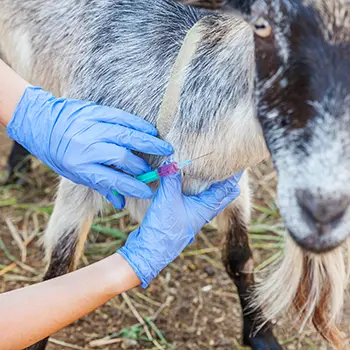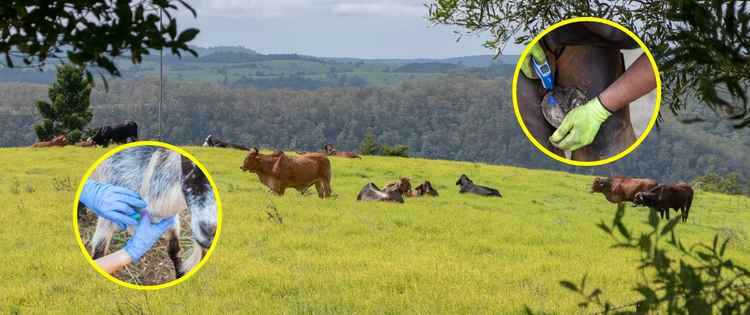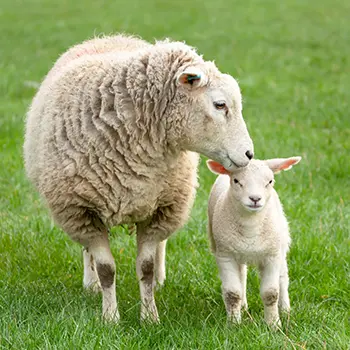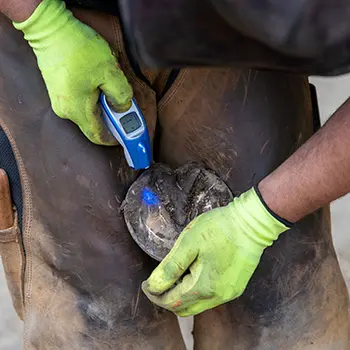Small farms and beginner farmers often lose livestock. There is, after all, a saying in the farming world: if you have livestock, you’ll also have deadstock. It’s unfortunate, but it’s just part of life. Everything you have will, at some point in your farming adventures, pass away.
We do our best, but sometimes there is nothing left to do… or we’ve misunderstood too long, and we miss our window of opportunity to fix a small problem. Let’s talk about some of the ways that you may lose livestock, especially in the beginning.
Overdosing Medication
A goat goes down to acute polio. You recognize the signs. Panicking, you dose her with vitamin B (acute polio in small ruminants is a thiamine deficiency issue, not a virus). It’s too late. You overdosed her with amprolium and nothing is going to bring her back from that. You lose the goat.
This exact thing happened to me on one occasion. I was dosing a goat directly with diluted amprolium due to a coccidiosis infection in the herd (and the fact that the herd refused to drink the water with the medication mixed in). I spilled it. A younger sibling went inside and mixed another batch of diluted liquid amprolium. I checked the ratio with him, and he agreed that he’d diluted everything correctly, and the amount in the drench syringe looked correct to me.
I dosed the goat.
12 hours later, she was gone. It turned out that he had confused the bottles of medication; the amprolium he used was 300x strength vs the type he thought he was using. The goat never had a chance and neither did I once I realized what had happened.
These. Things. Happen. Before you get any livestock, know that you or a veterinarian or someone in your life will incorrectly dose your livestock and you will lose one. A vet I know accidentally dosed a cow with so much concentrated Prohibit that the cow passed.
Mistakes happen. Do better next time, but realize that it is your fault when those mistakes do happen. Write them down. Remember them. Don’t do them again.
Misinterpreting the Signs
You have a young ewe, a bottled lamb, whose stomach is simply enormous after being bottle-fed even something as small as two ounces of formula. You give this young lamb a very mild treatment for bloat because she is acting as if this is bloat and it certainly appears to be bloat.
The lamb is terminal. She has a water belly and has, somehow, survived through birth (very rare). There is nothing that can be done for this lamb, but you still try. Good for you, but you cannot fix a peritoneal infection that has completely destroyed the digestive tract of a newborn before they are born.
The lamb passes. You do a necropsy and discover the signs of water belly. Would it have been more ethical to put the lamb down to begin with? Or did you try to save an incurable baby because that’s just what you do, and you’ve never seen a water belly before?
It’s a hard call. It will always be a hard call. Water belly lambs almost never live. A million-to-one shot is not an exaggeration. It is, theoretically, possible that the lamb will make it. Bluntly, it won’t.
Related: Best And Worst Livestock For Homesteaders
Sometimes, you think that one thing is happening within an animal, and no; it is something entirely different. This happens even with the best veterinary advice and testing. Ultimately, we only have so much science to back us up when it comes to trying to fix our animal friends.
What may actually be a buck goat with a blocked urethra can look like coccidia issues if the goat has diarrhea from stress. Especially since they’re likely carrying coccidia if you live in a marshy area like I do; any test will show coccidia, and a vet may not catch that the goat is straining to urinate because straining to have diarrhea becomes an issue, too. And then it is just general straining.
This second example happened to a friend of mine who raises mixed-breed, dual-purpose goats. He had a buck who had fountains of diarrhea because of the stress of not being able to urinate. It was only on the necropsy that they realized the goat’s bladder had burst and killed him. This was after two different vet consultations that assured him using kaopectalin and a medicated feed (with coccidiostat) would fix the goat’s problems. It didn’t. Because that wasn’t what the problem ended up being.
Hidden Infections (or Infestations)
If you watch hoof-trimming videos, like I do (the state of my Facebook reels is a problem), you know as well as I do that livestock just love to do horrible things to themselves.
CHECK. FOR. A TEMPERATURE. Infestations and infections often cause fevers that are otherwise absolutely INVISIBLE until you find the tiny piece of metal in your prize pig’s hoof that’s penetrated the capsule and is causing all sorts of problems.
Unintentional Neglect
This one just comes down to ol’ fashioned farm know-how.
Sit down and read a book. Just sit and read. Storey’s various guides are a very good place to start if you’re seeing problems with your animals, from chickens to goats to sheep to cattle, and even horses. We cannot possibly cover in this article what a good, solid guide can do in several hundred pages.
If you don’t have a vet in your area, and many people reading this probably don’t; livestock veterinary have disappeared from a ton of areas since 2020, get a livestock veterinary manual for yourself. Talk to the local ag board and see if anyone in a county or three over does small and large livestock veterinary for you. While euthanasia is always an option, if you want to fight to save that animal, maybe that distant vet is your only option when things get really weird.
And maybe they tell you no. I know I’ve been told no several times because they were already too busy or their vet was sick.
Unintentional neglect can be due to any number of reasons. Even something as small as heavy copper in your water can kill your sheep and you’ll be left not knowing what’s going on without water testing. The worst neglect? Not knowing what your animals need to thrive. It goes so much more beyond fresh water, clean areas, good forage, and a solid feed pellet and/or minerals.
Sit down with a good book, listen to whatever vets you can find, and try your best. It’s all you can do.
8 Miniature Farm Animals You Should Raise
An Ingenious Eggshell Remedy and 25 Others Made from Things People Usually Throw Away (Video)
These Are The Most Dangerous Chicken Breeds. Do You Have Any Of Them?












